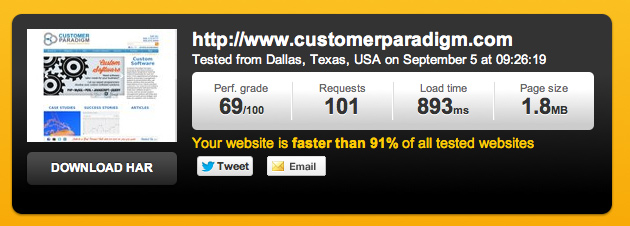|
Is Your Website Fast Enough?
Can your server handle two or three times the traffic load that might be typical during the holiday season?
A slow website will cost you sales and search ranking position.
Why? Google`s research shows that people who have to wait several agonizingly long seconds for a website to load often abandon that site, and move on to another site.
A quick page load speed test will show how long your site takes to load.
Top optimized sites load in 1-2 seconds; 3-4 seconds is acceptable.
 |
| Speed test for the Customer Paradigm website – load time is less than 1 second. |
Anything longer than 5-10 seconds will cause a precipitous drop in visitors staying on your site.
What goes into page load time?
1. Web server power.
If your site is hosted on the same shared server as 500+ other sites, you are sharing the power of the site with all of the other 500+ websites. Even if your site is well optimized for fast loading, a slow web server is just like that vintage Windows 95 computer gathering dust in a back closet. Yes, it will work, but it`s going to take a long, long time while the computer thinks and thinks…
2. Graphics, video and other “heavy” content.
Graphics and video don`t really weigh anything — they are just a bunch of 1s and 0s that are stored on a hard drive somewhere.
But just as it takes a long, long time for you to download that extra-high-resolution image that someone emailed to you, really large graphics that haven`t been optimized for web viewing “weigh” down the process of downloading a page.
Try not to save images at 100% quality in photoshop for the Web; 85% is more than sufficient for most users, and will shave countless seconds from your site.
Video is best hosted, stored and served by YouTube. You can use an embed code to have the video play on your site. YouTube has direct connections between their video servers and many of the major ISPs (such as Comcast), allowing their videos to load 3-4 times faster than if they had to be served through the Web.
3. Database queries.
If your site uses a content management system, chances are it`s using a programming language (such as PHP) and a database (such as mySQL) to organize and store the content. Each time a user comes to the home page of your website, for example, your content management system needs to make different database lookups to build the top menu, left menu, central content area, bottom navigation, and other specialized content areas on your site.
Loading just one page could mean you need 10-15 different database calls to generate all of the content. This can make your site a lot slower to load.
What can be done?
A. Page Caching.
There are several ways to create a static cached version of your site. Depending on what content management system you`re using (such as WordPress or Magento Commerce), you can use a caching system like Varnish that can take your page load times from 8-10 seconds, down to less than 1 second.
We use this on the Customer Paradigm site, and it dramatically speeds up page load times. Google sees short page load times and very few users abandoning the site, and rewards our site with high search rankings.
B. Resize images properly.
This is an easy thing to do, and can in many cases decrease your page load time by ten times or more!
C. Create a server load test.
You can simulate 500 users coming to your site in rapid succession to make sure your site can hold up to the load. This is something we can help assist you with, too.
D. Review how much you`re paying for your Web hosting.
If you are only paying $10.95 per month for a shared hosting account (where you might have 500 other websites on the same server), don`t expect to have the same type of performance that a dedicated server that costs $150 or $200 per month will give you.
A rule of thumb is that your web server often will cost 2-3% of your monthly sales revenue. If your site generates $10,000 in revenue (either business to business leads or business to consumer eCommerce sales), expect to pay $200 – $300 per month for a solid web server.
E. Upgrade your Web hosting — before the holiday rush
Upgrade now, before the holiday crunch, and your hosting company is backed up with requests from other websites that also need to improve their speed.
|